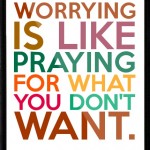 Have you ever heard somebody say to another person “Don’t spill that coffee” and seen that exact thing happen, that you know will happen…. which is that they do spill the coffee by accident!
Have you ever heard somebody say to another person “Don’t spill that coffee” and seen that exact thing happen, that you know will happen…. which is that they do spill the coffee by accident!
Right now you are laughing because it is funny. It is funny because it happens all the time. And if you are still laughing it may be because you are masterful at getting what you don’t want?
For some reason it seems the more you tell someone NOT to do something, the more likely it is that it WILL happen. Why is that? Sometimes we attribute it to simple disobedience – for example a child testing a parent, when the parent has said “don’t do that.”
However, it is more than just a simple testing of the boundaries. There is a biological, scientific reason for getting what you don’t want and it has to do with the way that our brains are wired.
So why do we always seem to do the very thing that we are told not to do?
Our Subconscious brain struggles to process negatives. In effect it hears and acts upon the command to do the very thing that we DON’T want it to do – i.e. “smoke” or “spill the coffee.”
In fact, the subconscious mind cannot think – it can only ACT or CREATE based upon what is of VALUE. That value is a product of our map of reality and every event we have experienced over a lifetime. The subconscious is actually 100x more powerful than the conscious mind and the subconscious is an AUTOMATIC mechanism. It kicks in and acts about 1/2 second before the conscious mind does – so if your embedded beliefs, attitudes, values etc. are negative, you end up always getting what you don’t want.
If you say to yourself over and over “Don’t spill the drink” or you tell a child “Don’t miss the ball”, you are focusing the attention of the subconscious mind on the opposite of what is desired. Instead of saying “carry the drink safely to the counter” or “hit the ball son”, you have commanded the automatic mechanism to do exactly what you DON’T want. The automatic mechanism of the mind is focusing on missing the ball. It’s not that the mind doesn’t hear the word “Don’t” (or cannot understand it) it’s that the ENTIRE SENTENCE is designed to create the opposite of what is wanted. You have to look at the sentence in its entirety to understand why it will not work to create the desired effect.
That is in fact why many books self help books, DVDs and audio CDs DON’T work to deter unwanted habits and behaviours. Many of the NLP and hypnosis practitioners have loaded their materials with embedded commands like “you will not have any problems sleeping”, “you will not want to have any more cigarettes” or “you will no longer have cravings for fried chicken and beer”. Unfortunately, these programs are doomed from the start. They only serve to further entrench these undesirable patterns.
If you want to change behaviour or get around a problem you must think of new ways to phrase the desired behaviour in a positive way. This requires the removal of all negatives or references to the problem in the sentence. Rather than saying “Don’t mess up the calculations” you could say “Be careful to ensure all the calculations in the spreadsheet are double checked and correct”. Instead of saying to your child “Don’t throw that toy at your sister” you should say “Put the toy down now and come to me”.
Instead of telling yourself what NOT to do, focus exclusively on what you want do to (or have happen). It can be difficult for some to unlearn old patterns and pessimistic language. However with practice and the positive reinforcement that comes from achieving the results that you desire most, you will find yourself speaking and behaving in new and empowering ways.
Article Source: http://EzineArticles.com/3142214
17 Oct 2011
What’s The Best Way to Break a Bad Habit?
Without a doubt, the number #1 question I get asked by clients is ‘how do I break a bad habit like procrastination, worry, insomnia, negative thinking or smoking’? There are a million examples of ways that each one of us holds our own success back by ‘doing’ unproductive habits. To make lasting change to deeply ingrained bad habits using willpower and positive affirmations alone is not realistic.
Everyone knows that positive thinking is undependable and produces inconsistent results, at best. The self-image on the other hand underpins our level of emotional intelligence (EQ), which is now recognised as being an even more important measurement for success than the IQ. It has been scientifically proven that our brain circuits take engrams or memory traces, and produce neuro connections only if they are bombarded with the information for 21 days in a row. This means that our brain does not accept ‘new’ data (ie break a bad habit) unless they are repeated each day for at least 21 days, without missing a day.
If you want to break bad a habit like refusing to let go of the past, spending all your time worrying about what might go wrong, overeating, biting your nails or spending more than you earn, it can be done but it will require consistent effort on your part, every day for at least 21 days. In order to do it, your success rate will improve significantly if you can replace that old habit you no longer need with a good and productive habit that will support you to achieve your goals and find someone to help keep you accountable.
And remember, no matter where you are in your life right now — the choices you have made or the experiences you have had — you can break a bad habit because it is never too late to become the person you were meant to be!
09 Oct 2011
How To Forgive and Let Go of The Past
It is very possible that the concept of forgiveness may be the most misunderstood and underutilized skill in the human experience. In the Greek language, forgiveness is the same word as release or letting go. This definition conjures up sensations of liberation, capitulation and freedom. On paper, it reads like a natural and benevolent process – something one freely GIVES to another to release yourself and others from the past. In practice however, it is often misunderstood as something that someone who has done us wrong must ASK of us.
The most precious gift that we have is our breath – without it, we would simply die. We can live for a short time without food, water, love and light but we cannot live for more than a minute or two without air. Breathing in and exhaling signifies the natural inevitability of the cycle of life: We take into our bodies the oxygen we need to live and we release or let go of carbon dioxide and other by-products that no longer serve us.
Our experience of life bears a striking resemblance to this natural process. We are constantly taking in the world around us and our interactions with others produce a myriad of consequences – some are positive while others are not. Unfortunately, negative or hurtful experiences are inevitable. As human beings we all have the same capacity to inflict harm through our words, actions and inactions, whether knowingly or unknowingly. But we all know that we cannot hold our breath forever; the release of by products and things that no longer serve us is an instinctive function. By the same token, sooner or later we all must discover our innate capacity to forgive.
Forgiveness, like exhaling, is an act of faith. It can neither be stopped nor compelled. There is no proof that peace will follow or that the release from anger, vengeance or self-righteousness will be immediate.
On our deathbed, I doubt any of us would say ‘I wish I held onto more anger and resentment or took a bit longer to forgive.’ In fact, if you were to look out into the future and imagine the world and all of your relationships from a position where you knew with absolute certainty that they would be gone tomorrow, would you act differently today?
Would you regret not having closure? Would you mourn the years that you kept yourself enslaved by bitterness, blame and indignation? Would you lament the loss of pleasure, love and peace that could have been yours if only you could have found a way to forgive sooner? Does the thing that you are fighting or obsessing about now really even matter in the grand scheme of things?
We all know our own pain – we are intimately familiar with the injustices that we have suffered, the crosses we have had to bear and the countless nights that we have cried ourselves to sleep. What we don’t fully grasp is the depth of another’s pain – the unspoken abuse, neglect, prejudices, anguish, loss, torment or afflictions. At the time, we think we are the only ones who are hurting and we forget that the scars and burdens of others are not always visible on the outside. We can never truly know another’s plight until we have walked a mile in their shoes. I believe that the first step toward forgiveness is simply the willingness to take one’s own shoes off and put another’s on. The rest can be surprisingly easy.
To learn more about forgiveness I recommend that you read On The Shoulders of Giants. In Chapter 28, I explain in detail exactly how I learned to forgive the four boys who were responsible for the murder of my mother several years ago in Canada. I know first-hand how difficult it can seem to forgive but I also know the awesome release, strength and freedom that can come from the ultimate gift of love – forgiveness of yourself and others.
Haven’t you already waited long enough to be released from those old emotions that no longer serve you? When is now a good time to change and to move forward toward your bright and compelling future?
28 Sep 2011
What If You’ve Already Got The Life You Deserve?
 I have been fortunate to discover that there is a reason for all things – even those that are senseless and incomprehensible – and that we have to learn to trust that there is a bigger picture that perhaps we, as mere human beings, can never truly understand.
I have been fortunate to discover that there is a reason for all things – even those that are senseless and incomprehensible – and that we have to learn to trust that there is a bigger picture that perhaps we, as mere human beings, can never truly understand.
What if you’ve already go the life you deserve?
The most beautiful expression of this idea I’ve ever read was in a children’s book ‘Little Soul in the Sun’ by Neil Donald Walsh. In the story, Walsh talks of a Little Soul who wants to be incarnated as a human being to learn ‘forgiveness’. A Friendly Soul agrees to oblige him by incarnating as a person to do something to the Little Soul that will help him learn the lesson of forgiveness. But the Friendly Soul issues a plea of caution and says, ‘at the very moment that I strike you down, please promise me that you will remember who I really am, a Friendly and loving Soul, otherwise we will be doomed to repeat the process over and over again until we get the learnings or until another Little Soul comes down to help us find the way out.’
In other words everything that happens in our life – the good the bad and the just plain ugly is the result of an agreement that we have made at some point in our existence to experience certain things so we can become better human beings and move on to the next lesson. We are all doing the best that we can with the resources that we think we have available. Everything is a learning experience and if viewed from that context, we can become empowered to create a world around us in the likeness of our dreams and wildest imaginations.
Even the really hard stuff happens for a reason. There is no failure, only results.
It isn’t about assigning blame or beating yourself up – it’s about being responsible for your response and deciding how best to move forward and attract the results that you want.
Blaming others – even if it’s legitimate – robs you of your power. It doesn’t help you move on – it’s a complete waste of your time and emotion. Put it in the past and find a way to ensure you never repeat it.
Things don’t change – WE change.
The only way to be the change that you want to see in the world is to take responsibility for the life that you say you want to be living. Regardless of the events and circumstances that have occurred, no answers may be found revelling in excuses.
You are already living the life you deserve and imagine in your mind every day. If you are not happy and you want more, you need to step up and BE more. Otherwise, you are destined to repeat the same experiences over and over until you learn the lesson. Even though it may be a hard pill to swallow, on some level you agreed to experience everything that has happened to you – you did this with the understanding that it would help you to grow and to evolve as a human being.
In fact, you already have the life you deserve (and wanted). It begs the question though – “when are you going to forgive yourself (and others), get the “learnings” and move on to the next important lesson that you have chosen for your evolution?”
11 Sep 2011
Is Anger a Symptom of Depression?
Many people believe that depression can result from anger turned inwards. Anger and depression are simply states of mind just like sadness, frustration, confusion etc. Yet many people mistakenly ask the question “is anger a symptom of depression”?
Anger does not cause (nor is it a symptom of depression). In my clinical experience, persistent anger does often co-exist with MANY other negative emotions – frustration, despair etc. However, in assisting clients to release these deeply ingrained patterns of negative emotions, it is often necessary to work with and release anger first as it is a strong, dominant, primary emotion. Often, unless anger is released first, it is impossible to face or address the underlying issue(s).
However, I do not believe anger causes or is a symptom of depression per se.
Depression often presents when a person is constantly worried about problems they perceive they have no control over. It results from a tendency to focus exclusively on the negative – thought, spoken word, physiology etc. Like anger, depression is not something that happens to us – it can be created and exacerbated by our thoughts, words and physiology over time. Over long periods of time, it is possible to develop a habit of being angry all the time and/or a habit of being depressed.
Statistics prove that the majority of us focus more of our attention on what we don’t want (or are afraid of) and we tend to do it with passion! Science has already proven that anything we do with strong emotion and passion creates a deeper engram (impression) on our minds.
Changing deeply ingrained habits or repetitive states of mind (whether they be positive or negative) requires repetitive autosuggestion over a period of at least 21 days. This fact was discovered in the 60’s by a plastic surgeon named Maxwell Maltz.
What this means is that we are always in control of our experience of the world – our emotions, our meanings and the habits we develop over time. No one causes us to feel angry or depressed. It is something that we choose to do ourselves, in response to our life experiences. The good news is that we can take responsibility and “unchoose” the unproductive states of mind or habits….thereby changing forever our results and our destiny.










